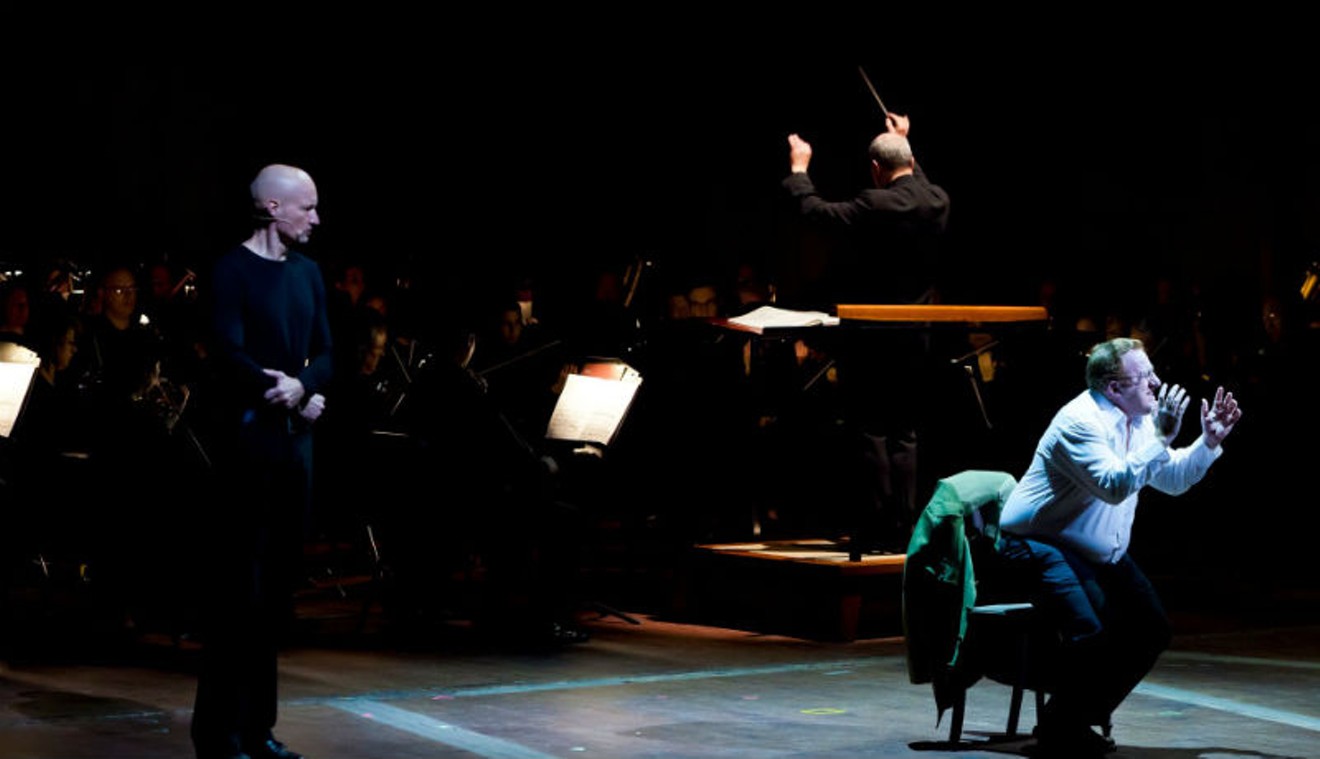Support Us
Houston's independent source of
local news and culture
account
- Welcome,
Insider - Login
- My Account
- My Newsletters
- Contribute
- Contact Us
- Sign out
One More Time For Our Review of the Grammy-Winning Wozzeck by the Houston Symphony
Houston Press January 30, 2018 11:09AM

The recording of this work made Houston Symphony history.
Photo courtesy Houston Symphony
[
{
"name": "Related Stories / Support Us Combo",
"component": "11591218",
"insertPoint": "4",
"requiredCountToDisplay": "4"
},{
"name": "Air - Billboard - Inline Content",
"component": "11591214",
"insertPoint": "2/3",
"requiredCountToDisplay": "7"
},{
"name": "R1 - Beta - Mobile Only",
"component": "12287027",
"insertPoint": "8",
"requiredCountToDisplay": "8"
},{
"name": "Air - MediumRectangle - Inline Content - Mobile Display Size 2",
"component": "11591215",
"insertPoint": "12",
"requiredCountToDisplay": "12"
},{
"name": "Air - MediumRectangle - Inline Content - Mobile Display Size 2",
"component": "11591215",
"insertPoint": "4th",
"startingPoint": "16",
"requiredCountToDisplay": "12"
}
,{
"name": "RevContent - In Article",
"component": "12527128",
"insertPoint": "3/5",
"requiredCountToDisplay": "5"
}
]
As announced this past Sunday, for the first time in its 104-year history, the Houston Symphony has won a Grammy Award. It won for its live recording of Alban Berg's Wozzeck under the director of Hans Graf, the symphony's former music director.
The recordings were made during concerts in 2013 by Brad Sayles, the symphony's recording engineer. But it took until January 13, 2017 before there was an international album release.
We thought it was worthwhile to go back to our archives to see what our reviewer D.L. Groover had to say about the performance in 2013. So here, we present, the original review.
Anyone interested in listening to this music in digital download or CD form can access them through Amazon.
The Original Review: March 2, 2013, by D. L. Groover
The setup: When you find out that Alban Berg's opera masterwork Wozzeck (1925) is playing in a concert version at the Houston Symphony, you're first impression is hardly to jump up and down and clap your hands, "Oh, goodie; quick, let's go hear Berg!"
Berg's opus is difficult work, hard to plow through, a full-throttle expressionist adventure. In a series of impressionistic, short scenes (15 in three acts, played without intermission), man's inhumanity to man gets vicious, ironic treatment, with an almost gleeful incapacity for the characters to feel empathy for one another. Wozzeck (baritone Roman Trekel) is a non-entity, a soldier who's the butt of jokes by his obtuse Captain (tenor Marc Molomot) and who makes extra money by being a medical experiment for the shady town Doctor (Nathan Berg). Wozzeck's only pleasure is lover Marie (soprano Anne Schwanewilms), the mother of his child, and his fellow soldier pal Andreas (tenor Robert McPherson).
But Marie, equally poor and without future, is smitten by the virile Drum Major (tenor Gordon Gietz) and has a quick loveless affair. She knows she shouldn't, but as she says, "Why not, they're all the same." She receives a handsome pair of earrings for her service. Driven to the edge of madness by society's indifference and his own inability to deal with life's woes, Wozzeck murders his lover, then, to wash off his guilt, drowns in the lake.
The execution: This unblinking journey through hell on earth, an adaptation of Georg Buchner's sketchy but influential 1837 drama Woyzeck, pays off in handsome ways, not least in some of the most atmospheric musical passages ever written: real tone poems that describe not only intense mental states and their cracking paranoia, but heart-breaking descriptions of nature, like blazing red sunsets, or a still dark pond at night; or reeling portraits of Viennese life on the wild side, like a raucous dance hall with drunk patrons, an out-of-tune pianola, set to a tilted waltz just this side of Richard Strauss. No wonder this opera caused such a stir at its premiere. It still does.
Berg was the beloved student of eminent Austrian composition teacher Arnold Schoenberg, who had already dazzled — if not knocked unconscious — the musical world with his 12-tone theories of music writing. Enamored of the novel atonal dissonance and the mental states that it could so easily conjure, Berg applied a steely structure to the wayward music, using musical forms that had existed almost from music's beginnings, like the sonata, rondo, passacaglia, and such. Adding a lush chromatic orchestral palette, thanks to Wagner, Mahler, and Richard Strauss, Berg pushed opera firmly into the 20th century.
Some might say he pushed it beyond its limits, but today his music, while not standard easy listening, is fraught with an inherent lyricism that overrides the aural jumble and is some of the finest writing ever for the opera stage. It is music that is full of blazing emotion, that's harsh in the extreme, but yet accurately conveys the inner mind. In Berg, the vocal line tells us what the characters say, but the orchestra tells us what they think.
The production, strikingly staged by Kristin Johnson, is simple and elegantly effective. Rehearsal clothes with appropriate touches for individual characters — a uniform jacket for the Drum Major, a blood red top for Marie, black long-sleeve tee for the reed-thin Wozzeck — and a spartan use of furniture is all that's needed. Everything's in the music already. Terri Batcheller's lighting is equally pared down: a blue wash on the ceiling for night, pure white for the Doctor's office, deep shadows for the lake scene. To set the stage, stagehands silently swoop on as if choreographed during the "interludes" between scenes, and in a flash there appears the dance hall with its quaint little band on a small riser stage left, or Marie's room with a table and chair. It's efficient, unobtrusive, and oh, so right.
Leading with fervor and biting color, maestro Hans Graf, in his last season with Houston Symphony, elicits every nuance and crashing dissonance in Berg's mighty score, drawing incandescent performances from his beloved orchestra. His love for Berg is undeniable. The stunning final interlude, which is a summation of the entire opera, with snatches of major themes swirling in majestic disorder, is testament to Graf's sumptuous respect and unparalleled technique.
His singers are no less impressive, perhaps the finest Wozzeck cast of principals in a decade. Trekel is downright magnificent as the poor schlub who gets buffeted by everyone. A striking stage presence, tall and wispy as a figure of Chinese calligraphy, he boomed through Berg's difficult passages and riveted our gaze. Neurotic and crazed, he elicited sympathy with a finely detailed performance. In a thrilling bit of business, he clutched his forearm with his free hand, almost as if willing himself to still be here, or perhaps holding himself from falling to pieces. He made Wozzeck painfully real, but a joy to watch and hear.
Schwanewilms, a lusty Marie, sings with crystalline purity and steely force like a young Birgit Nilsson. She galvanized the stage, radiantly cooing her lullaby to her baby boy, taunting the Drum Major with smoldering sexiness, or nervously confronting Wozzeck with a sad premonition of what's to be. She was a presence to be dealt with. The others in the ensemble, mentioned above, were equally inspired. In a role that is perhaps the shortest in any opera, tenor Brenton Ryan, as the Fool, who sniffs around Wozzeck in the beer garden and foreshadows the tragedy by squealing, "I smell blood," chilled with a bizarre interpretation and a white-hot tenor.
The verdict: Berg's seminal opera is so ripe that his lavish, keyless music can often sound like you're being smothered under bolts of heavy brocade. (His second and last opera, Lulu, left partially unfinished on his death in 1935, is a beaut, too). After centuries of music that sings with sweet melody, Berg's modern music seems cruel, if not downright verging on madness. But go with it, let it wash over you, and you'll soon discover real drama and atmosphere lurking just under the surface. While it's definitely music of the mind, there's plenty of heart in it. It's still opera, after all. It's just buried a little deeper and takes more work to find it.
KEEP THE HOUSTON PRESS FREE...
Since we started the Houston Press, it has been defined as the free, independent voice of Houston, and we'd like to keep it that way. With local media under siege, it's more important than ever for us to rally support behind funding our local journalism. You can help by participating in our "I Support" program, allowing us to keep offering readers access to our incisive coverage of local news, food and culture with no paywalls.
The Houston Press is a nationally award-winning, 34-year-old publication ruled by endless curiosity, a certain amount of irreverence, the desire to get to the truth and to point out the absurd as well as the glorious.
Contact:
Houston Press
Trending Arts & Culture
- The 10 Best And Most Controversial Hustler Magazine Covers Ever (NSFW)
- Whose Story is It in The Father at 4th Wall Theatre Co.
- Top 5 Sickest Stephen King Sex Scenes (NSFW)
-
Sponsored Content From: [%sponsoredBy%]
[%title%]

Don't Miss Out
SIGN UP for the latest
arts & culture
news, free stuff and more!
Become a member to support the independent voice of Houston
and help keep the future of the Houston Press FREE
Use of this website constitutes acceptance of our
terms of use,
our cookies policy, and our
privacy policy
The Houston Press may earn a portion of sales from products & services purchased through links on our site from our
affiliate partners.
©2024
Houston Press, LP. All rights reserved.





